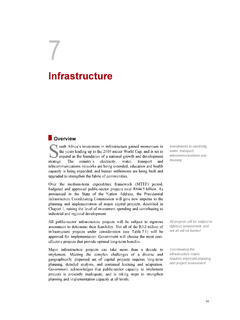Transcription of FAAQQss:: Y CEEAARRLLY VCHHIILLDDHH OOODD ...
1 FFAAQQss:: EEAARRLLYY CCHHIILLDDHHOOOODD DDEEVVEELLOOPPMMEENNTT TTHHEE WWOORRLLDD BBAANNKK,, JJUULLYY 22001100 What is Early Childhood development ? Early Childhood development (ECD) refers to the physical, cognitive, linguistic, and socio-emotional development of a child from the prenatal stage up to age eight. This development happens in a variety of settings (homes, schools, health facilities, community-based centers); and involves a wide range of activities from child care to nutrition to parent education. Providers of services can include public, private, and non-governmental agencies. DDiidd yyoouu 8855%% of the human brain develops by age 5. It is more difficult to improve cognitive development later. 5500%% of a child s cognitive capacity is influenced by his/her environment 7711 mmiilllliioonn children across Africa don t reach their full potential due to poverty and poor health, nutrition and care.
2 ECD encompasses a number of distinct sub-stages, each of which presents particular needs: Pregnancy and peri-natal: prenatal care, attended births, registration, postnatal care 0 to 3: parent education, early stimulation and nutrition interventions, home-based care, cr ches 3 to 6: parent education, preschool 6 to 8: transition to formal education, improved early primary school From a development point of view, children who come from the most vulnerable and disadvantaged backgrounds need good-quality services and care the most, including children with special needs. Why is ECD so important? These early years of life are a window of opportunity to lay a strong foundation for a child s life. Proper health, nutrition, and early stimulation play a critical role for brain development and child well-being. Around the world, poor children under 5 lag behind their more advantaged peers in physical, language, cognitive, and socio-emotional development .
3 Without access to quality ECD, poor children often fall behind their more advantaged peers before they even begin school. As they get older, the gaps widen: they are likely to perform poorly in school, earn less as adults, and engage in risky social behaviors. Supporting early childhood development improves equity improving the health, nutrition, and education outcomes of children. Research shows that ECD interventions benefit the poorest and most disadvantaged children the most even though these children currently are the least likely to have access to them. In addition, it is more difficult and more costly to intervene later in children s lives. ECD targeted to the most disadvantaged are a cost-effective strategy to promote children s success in school and life. Children who participate in quality ECD programs are more ready to learn when they begin school and are less likely to repeat grades or drop-out of school, which reduces the overall costs of the education system.
4 When they get older, they are more likely to earn more and less likely to engage in crime. Nobel Laureate James Heckman has calculated the returns on investment to ECD to be up to 18% - much higher than rates of return of other levels education. How do good quality ECD programs work? Quality ECD programs improve outcomes by providing: Critical health and nutrition inputs Better access to primary school Higher retention in primary school Improved gender equity in education Lower repetition rates Higher achievement in education ECD programs that address multiple needs combining nutrition, de-worming, and psychosocial stimulation have a more positive impact on children s learning than any of these interventions alone. What are African governments doing in ECD? Governments have been introducing ECD programs at strategic entry points, such as: Parenting, nutrition, and stimulation for under 3s in Madagascar and Uganda Pre-primary classes (Grade R) in Ghana, Kenya, Liberia, Lesotho, Nigeria, South Africa Community-based centers in the Gambia, Guinea, Kenya, and Malawi Integrated ECD (education, health, nutrition, child protection) in Eritrea, Senegal, and Tanzania Conditional cash transfers linked to early childhood development in Ghana, Kenya and Malawi What is the World Bank s role in ECD in Africa?
5 The World Bank s Africa Early Childhood Care and development Initiative is providing technical and financial support to 10 countries (Guinea, Liberia, Malawi, Mali, Mozambique, Niger, Nigeria, Senegal, Tanzania, and Zambia). Analytical work and technical assistance are helping countries expand access and improve quality of ECD services. For example, in Niger, results from World Bank-supported studies informed the Ministry of Education s decision to create a preschool class in each primary school. In Liberia, the World Bank has helped the government include ECD in its new education sector plan and raise new funds for creating ECD centers in rural areas. The World Bank is developing ECD projects in countries with strong government interest and capacity to go to scale with cost-effective ECD programs. With World Bank financing, three states in Nigeria are training teachers and providing play/learning materials to preschool classes in government schools.
6 In Malawi, the World Bank is supporting the government to design, implement, and evaluate strategies to improve the quality of its community-based childcare centers. A new ECD project is under preparation in Mozambique and self-standing ECD projects are under discussion in several countries. Why is the ECD Workshop being held in Cape Town? This World Bank workshop, organized in partnership with the Human Sciences Research Council (HSRC), will give delegates from 10 countries the opportunity to report on their progress, exchange experiences, and develop concrete action plans for implementation. Delegates will learn from South Africa s experience in developing its national ECD policy and implementation plan and which has encouraged incremental growth in resource allocation to the sector. The country also has diverse and active ECD stakeholders, including direct services providers, research organizations, and advocacy groups, working with government towards responding to and developing innovations to scale up access to ECD programs.
7 Delegates will visit examples of these innovative ECD services in the Cape Town area. FFoorr mmoorree iinnffoorrmmaattiioonn:: Marito Garcia or Michelle Neuman

















